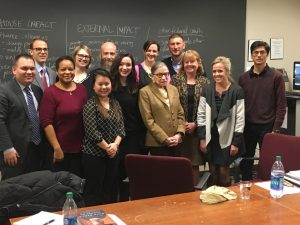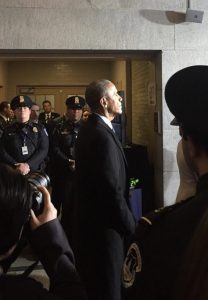Tributes to Supreme Court Justice Ruth Bader Ginsburg have flooded in from all over the world following her passing. I echo many of the sentiments already expressed: America has truly lost its icon of feminist jurisprudence. Our society, the laws we live by, and our nation’s prosperity are better because Ruth lived. Only now with her death do I feel it is appropriate to publicly share stories from the time I spent with her in the days leading up to the inauguration of President Donald Trump.
In January 2017, I was a third-year law student at Georgetown Law and working full-time on Capitol Hill for Senator John Thune (R-SD). I began my career on Capitol Hill 12 years earlier as an intern for Senator Orrin Hatch (R-UT) and more recently had worked for then-Senator Dan Coats (R-IN). Like many of my Hill staffer colleagues, I had volunteered to help with the Presidential Inauguration. Would-be volunteers apply months in advance before we even know who the President will be. We are later interviewed by staffers from the Joint Congressional Committee on Inaugural Ceremonies (JCCIC) to determine assignments.
Regardless of who the President was going to be, I knew I would be happy to serve as a host to guests of our U.S. Capitol building who would soon be coming to witness the Inauguration ceremonies of the President and Vice President. I have a deep love for this extraordinary building and know every back staircase, shortcut, and basement tunnel by heart. A few weeks before the January 20, 2017 ceremony, I was assigned to escort VIPs from their holding rooms to the Inaugural stage. I could not have guessed at the time what I would later personally witness.
What no one knew at the time was that Justice Ginsburg herself would teach part of the course.
As preparations and rehearsals were underway at the Capitol, I also had obligations across the street as a third-year law student at one of the most elite law schools in the world—Georgetown Law. Georgetown has optional 1-credit courses offered prior to the beginning of a semester, befittingly called “Week One” courses. I applied for and was admitted to a specialty Supreme Court Topics course on dissents by Supreme Court Justice Ruth Bader Ginsburg and taught by Ruth’s official biographer, Professor Mary Hartnett. What no one knew at the time was that Justice Ginsburg herself would teach part of the course. Only 10 students were admitted to the class.

On January 10, 2017, I spent several hours being taught by Justice Ginsburg. The nine other students in the course and I discussed with Justice Ginsburg some of her most famous dissents and bench announcements. We discussed the equal protection method and rational basis; race discrimination and strict scrutiny; gender discrimination and intermediate scrutiny; sexual autonomy and reproductive rights; and freedom of expression. When class was finished, Justice Ginsburg graciously invited us to watch President Barack Obama’s farewell speech live with her that evening. We all readily accepted.
A short while later, we were all situated to watch our then-President address us one last time. I was seated to the right of Justice Ginsburg with a profile view of her as we watched the screen. President Obama’s speech was poetic and poignant. Justice Ginsburg often nodded along with what he was saying. Obama pointed out that “…democracy does require a basic sense of solidarity—the idea that for all our outward differences, we’re all in this together; that we rise or fall as one.” Justice Ginsburg, with her tiny stature but mighty presence, solemnly muttered an emphatic “Yes!”
Ten days later, I was at the Capitol situated at the bottom of the “chute”—the long tunnel leading from the Crypt to the Inaugural stage. I was waiting for my last VIP to arrive so I could escort him to his seat outside on the stage. As I waited, I watched with fascination and admiration as others lined up in the chute to take their place: President and Mrs. Carter, President and Secretary Clinton, President and Mrs. Bush, Michelle Obama, and all eight Supreme Court Justices. As Justice Ginsburg made her way down the chute, I quietly whispered hello to her in my mind. Out of respect for decorum, it would have been inappropriate for me to interrupt her to say hello. However, she caught my eye and softly smiled and nodded her head toward me. I reverently smiled back.
Before I knew it, the final dignitaries were making their way down the chute: Nancy Pelosi, Chuck Schumer, Paul Ryan, and Mitch McConnell. Following closely behind were President Barack Obama and Vice President Joe Biden. They were ahead of schedule and had to wait for several minutes in the chute before going out to the stage. President Obama was less than two feet away from me and I found myself overcome with emotion.

All was quiet in the chute except for the faint patriotic music we could hear coming from the stage. I stood staring at the profile of this man. Our current president. Still the leader of the free world, in the final minutes of his presidency. In less than half an hour Obama would go from President to ordinary citizen. He closed his eyes and took several big breaths as if he were meditating. The calm on his face looked as if he was taking everything in. I quietly captured that moment with a picture on my phone.
Before I knew it, President Obama turned and looked at me and those standing around me. I realized warm tears had gathered in my eyes and were slipping down my cheek. President Obama reached out to shake my hand. As our hands embraced he firmly said, “it’s all going to be okay.” I wiped my tears away as I replied, “thank you. Thank you so much for all of your sacrifices.” President Obama was then called to the stage.
A moment later, I was surrounded by a SWAT team and I knew that Donald Trump must be near. Sure enough, Trump came into view in the final stretch of the chute. There were still several minutes before he was due on the stage and he stood alone waiting in the same spot Obama had stood just seconds before. Everything and everyone was painfully quiet. The air was heavy with questions—the mystery of what would happen when Donald Trump took his oath of office and became President of the United States. Ready or not, we would soon find out. As his name was called, I watched Donald Trump leave the civilian world behind to take on the mantle of the Presidency. As we all know, it didn’t take long for controversy, chaos, and confusion to set in at 1600 Pennsylvania Avenue.
It has been nearly four years since I sat at the feet of Justice Ginsburg and then witnessed first-hand the changing of the guard at the White House. The two experiences are interwoven in my memory because I can’t properly explain the influence Justice Ginsburg had on me unless you understand the context of what was happening in the world when we met.
If the world felt divisive in January 2017, it pales in comparison to how the bitterness and fatigue feel today. Before you read the next news article or watch an interview on television or talk about politics with your friends and family, I have two lessons from Justice Ginsburg’s life for you to consider.
First, words matter. Justice Ginsburg changed the way I read and write. Words can paint pictures, I learned from her. Choosing the right word, and the right word order, she argued, can make an enormous difference in conveying an image or idea. Her dissents and opinions are persuasive. The examples and stories she shares are logical and not overly emotional. Justice Ginsburg made her point and respectfully allowed others to express their beliefs.
Words really do matter, but most importantly in our personal lives.
I have read thousands and thousands of documents relating to legal matters. Any entire case can hinge on the interpretation of one word. Words really do matter in many different contexts, but most importantly in our personal lives. Choose your words carefully and be open to the idea that other people have sincerely held beliefs that are as equally earnest and well-intentioned as your own.
Second, Justice Ginsburg showed up. No one is legally compelled to go to the inauguration except the incoming president. Even the sitting U.S. president does not have to attend. But Justice Ginsburg braved the cold and showed up that January morning. She did not want Donald Trump to be the president, but she understood it was an important moment in history. Her attendance was not a sign of conformity; it was a sign that she’s dedicated to decorum, respect, and democracy.
Likewise, you can show up. You can show up for your friends and your family with whom you may disagree. You can attend the wedding, the birthday party, the Sunday family dinner, or whatever else you are invited to without compromising your beliefs. Your presence is important.

I gave birth to my first child—a tiny baby girl—a few weeks ago. She is sleeping peacefully next to me as I write this tribute. I want my daughter to know who Ruth Bader Ginsburg was. Ruth was a lawyer, daughter, sister, wife, mother, professor, leader, writer, scholar, feminist, and friend. She was kind, deliberate, strong, thoughtful, bold, intelligent, and brave. She was stunningly beautiful. I want my daughter to know women like Ruth. More importantly, I want my daughter to be like Ruth.
The rising generation, more so than any other generation, believes in a fair, and just, and inclusive America. They are altruistic, sensitive, unselfish, and willing to carry the hard work of democracy forward. I hope the example of Ruth Bader Ginsburg and her life will continue to guide them and all of us. Show up, choose your words carefully, and never, ever give up.
The post Ruth Bader Ginsburg, Donald Trump, and Me appeared first on Public Square Magazine.
Continue reading at the original source →



